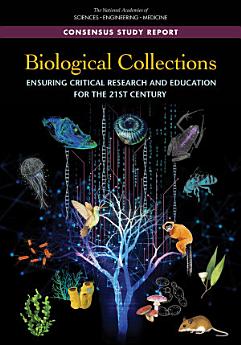Biological Collections: Ensuring Critical Research and Education for the 21st Century
National Academies of Sciences, Engineering, and Medicine · Division on Earth and Life Studies · Board on Life Sciences · Committee on Biological Collections: Their Past, Present, and Future Contributions and Options for Sustaining Them
ডিসে ২০২০ · National Academies Press
ই-বুক
244
পৃষ্ঠা
reportরেটিং ও রিভিউ যাচাই করা হয়নি আরও জানুন
এই ই-বুকের বিষয়ে
Biological collections are a critical part of the nation's science and innovation infrastructure and a fundamental resource for understanding the natural world. Biological collections underpin basic science discoveries as well as deepen our understanding of many challenges such as global change, biodiversity loss, sustainable food production, ecosystem conservation, and improving human health and security. They are important resources for education, both in formal training for the science and technology workforce, and in informal learning through schools, citizen science programs, and adult learning. However, the sustainability of biological collections is under threat. Without enhanced strategic leadership and investments in their infrastructure and growth many biological collections could be lost.
Biological Collections: Ensuring Critical Research and Education for the 21st Century recommends approaches for biological collections to develop long-term financial sustainability, advance digitization, recruit and support a diverse workforce, and upgrade and maintain a robust physical infrastructure in order to continue serving science and society. The aim of the report is to stimulate a national discussion regarding the goals and strategies needed to ensure that U.S. biological collections not only thrive but continue to grow throughout the 21st century and beyond.
ই-বুকে রেটিং দিন
আপনার মতামত জানান।
পঠন তথ্য
স্মার্টফোন এবং ট্যাবলেট
Android এবং iPad/iPhone এর জন্য Google Play বই অ্যাপ ইনস্টল করুন। এটি আপনার অ্যাকাউন্টের সাথে অটোমেটিক সিঙ্ক হয় ও আপনি অনলাইন বা অফলাইন যাই থাকুন না কেন আপনাকে পড়তে দেয়।
ল্যাপটপ ও কম্পিউটার
Google Play থেকে কেনা অডিওবুক আপনি কম্পিউটারের ওয়েব ব্রাউজারে শুনতে পারেন।
eReader এবং অন্যান্য ডিভাইস
Kobo eReaders-এর মতো e-ink ডিভাইসে পড়তে, আপনাকে একটি ফাইল ডাউনলোড ও আপনার ডিভাইসে ট্রান্সফার করতে হবে। ব্যবহারকারীর উদ্দেশ্যে তৈরি সহায়তা কেন্দ্রতে দেওয়া নির্দেশাবলী অনুসরণ করে যেসব eReader-এ ফাইল পড়া যাবে সেখানে ট্রান্সফার করুন।







